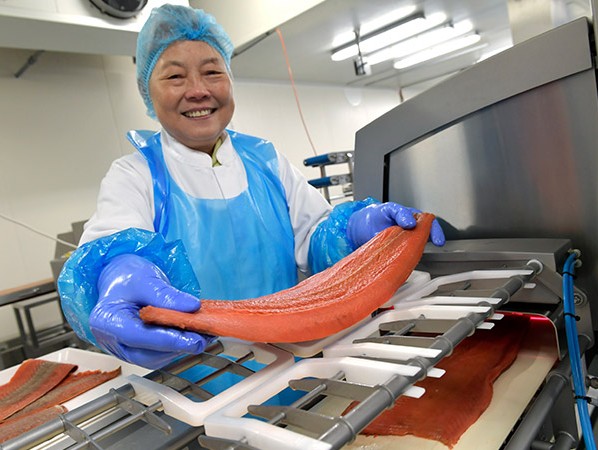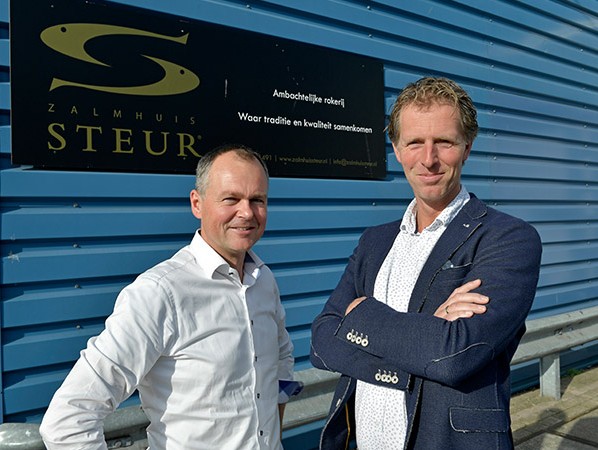
At Zalmhuis Steur, salmon is being conserved and smoked in the same way for already a century. This traditional and artisanal work method provides an excellent taste and quality. But how can the food safety be guaranteed?
Starting a smokehouse in Monnickendam in the early 1900s was certainly not unusual as its location along the Zuiderzee was perfect for such a business. But when the Zuiderzee was partly drained and closed off in the 1930s, most smokehouses disappeared or switched to eel. The Steur family, however, chose differently: they focused on salmon. A bold choice, but over the following decades, smoked salmon slowly became more commonplace and grew in popularity. By the early 1990s, the fish had even become a commodity product.
That was also picked up by fish company Jan van As. The company struggled with the fact that the increased trade in smoked salmon also made the product more price-oriented. The result: a lower quality. This was reason enough for the company to make plans for its own smokehouse. And as there was no one at Steur willing to succeed in the business, the deal was quickly made: Jan van As took over Zalmhuis Steur. The location in Monnickendam remained, just as the artisanal smoking process. "All the other processes are done in Amsterdam, at a stone's throw from the parent company", says Gert Schram, QA Manager at Zalmhuis Steur. "In Amsterdam, around a hundred tons of fish a year is sliced, packaged, and distributed to fishmongers in the Netherlands and Belgium." The salmon itself is shipped in from further abroad. "Our wild salmon mainly comes from Alaska. There, the number of salmons is monitored during the 'salmon run': the time of the year in which the fish returns from the sea and travels to its place of birth to spawn. Only when the quota has been reached, the salmon can be caught. The farmed salmon, which is mostly bought by the consumers, comes from Norway. "In Norway, the natural living environment is simulated in large freshwater basins and in the saltwater fjords. The salmon is slaughtered when it is around three years old. This is done in such a way that it causes the least amount of suffering to the salmon."
This responsible approach is typical for the entire business operation at Zalmhuis Steur. For example, they only process MSC and ASC certified fish. "Not just because the consumer has become more conscious and critical; we also set great store by issues such as a healthy fish population, sustainable fishing methods, and responsible farming methods", says Gert. This awareness regarding our business operations goes beyond setting requirements on the sustainability of the fish. Wijgert van As, board member and co-owner of Jan van As explains: "At the smokehouse, the salmon is dry salted for preservation and then cold smoked for approximately 15 hours. This process hasn't changed in 100 years. And this is all the treatment the fish gets; we don't inject acids or lactate to prolong its shelf life. This is how we clearly distinguish ourselves from industrially processed smoked salmon.

Even though the preservation and smoking process may be unchanged, the other processes, such as the care for hygiene and food safety certainly did change. A few years ago, Zalmhuis Steur decided to employ quality control laboratory Nutrilab to guarantee the food safety within the indicated shelf life. Wijgert: "Our hygiene requirements are high, but Listeria is a risk you cannot discard with cold-smoked, unprocessed salmon. Nutrilab examines how Listeria and other bacteria behave on our product".
"In this, we collaborate closely, with each other and with the Dutch Food and Consumer Product Safety Authority (NVWA)", says Pieter Vos, Executive Director of Nutrilab. Nutrilab tests food products on nutritional values and food safety, amongst other things on (bacterial) pathogens and contaminants, for Dutch and international clients in the food and feed branch. He continues: "We conduct safety tests on both the end product and on the environment, such as knives and tools".
The laws and regulations issued by the EU have changed and the enforcement has increased. Specific product groups, including cold-smoked salmon, are more thoroughly tested and examined. This requires a transparent attitude from Zalmhuis Steur. Pieter: "We have a clear vision on food safety. And to reach a consensus with our clients, we have to allow each other a peek behind the scenes. Only then are we able to examine how Listeria can be controlled and how we can jointly guarantee the food safety. Luckily, we completely agree on that".
According to Wijgert, the involvement of Nutrilab goes further than the sharing of test and research results. "They truly stick their necks out for us. They advise us about the frequency of the checks, for example, and about what we should or don't have to get tested." By the way, these tests have not shown any deviating Listeria values so far. Wijgert van As: "Fortunately not, because making any concessions on the quality of our salmon is not an option".
Source: © Fotoburo Dijkstra